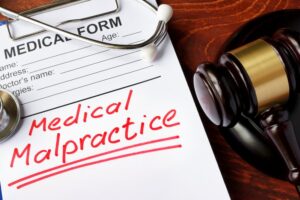When it comes to the complexities of healthcare, trust is fundamental. You trust your healthcare providers with your life and well-being, believing they adhere to the highest standards of care. However, medical errors do happen, and they can lead to severe consequences. In some instances, this may point towards medical malpractice. But what exactly is medical malpractice, and how do you know if you have a valid malpractice case?
At Allen & Allen, our medical malpractice lawyers understand the weight that an unexpected injury can have on you. We aim to shed light on the concept of medical malpractice, the legalities surrounding it, the role of a medical malpractice attorney, and more so that you are equipped to make decisions that will benefit your future and empowered to pursue justice for your injuries. If you believe you may have grounds for a medical malpractice claim in Virginia, contact our personal injury law firm today to discuss your rights with a qualified attorney.
What is Medical Malpractice?

When we speak of medical malpractice, it essentially refers to scenarios where a healthcare provider, such as a doctor or nurse, deviates from the accepted standards of practice in the medical community and causes harm to the patient. Medical malpractice is, therefore, a form of professional negligence that can have fatal consequences for the patient involved.
One key aspect to remember is that not all medical errors constitute malpractice. Medical procedures and treatments often involve inherent risks, and the occurrence of a negative outcome does not necessarily signal malpractice. To have a valid medical malpractice claim, the medical professional’s act or omission must violate the standard of care.
So, what is this ‘standard of care’? It is the level at which the average, prudent provider in a given community would manage a patient’s care under the same or similar circumstances. If a healthcare provider does not meet this accepted level of care and the patient experiences harm as a result, it constitutes a breach and, thus, a potential case of malpractice.
Medical malpractice can take many forms, including misdiagnosis, delayed diagnosis, medication errors, surgical or procedural errors, childbirth injuries, and more. Understanding what constitutes medical malpractice is the first step in determining whether or not you may have a case. In the following sections, we will explore this in more detail, providing you with the necessary knowledge to make an informed decision.
Common Types of Medical Malpractice in Virginia

Medical malpractice in Virginia can arise out of a variety of situations. Being aware of the different forms it can take is essential to determine if you might have a viable case. Here are some of the most common scenarios:
- Misdiagnosis or Delayed Diagnosis: If a healthcare provider fails to correctly diagnose a patient’s condition or significantly delays diagnosis, and the patient’s condition worsens as a result, this could be a valid case of malpractice.
- Medication Errors: From prescribing incorrect medication to improper drug dosage or failing to check for possible adverse drug interactions, medication-related mistakes can lead to severe consequences and qualify as malpractice.
- Surgical Errors: Instances of medical malpractice during surgery may include performing an unnecessary procedure, operating on the wrong body part, or leaving surgical instruments inside a patient’s body.
- Childbirth Injuries: Negligence during prenatal care or the course of delivery can lead to significant harm to the baby or the mother and constitute malpractice.
- Anesthesia Errors: Mistakes involving anesthesia can be fatal. Overdose, failure to monitor the patient’s vital signs, or improper intubation can all form the basis of a malpractice suit.
- Inadequate Follow-up or Aftercare: Negligence post-procedure in providing proper instructions and follow-ups or responding incorrectly to complications may also pose grounds for malpractice.
While not exhaustive, these examples share a common theme – the breach of the standard of care directly leading to patient injury or harm. If you believe you’ve experienced a similar situation, consult with an experienced medical malpractice attorney in Virginia to guide you further. The ultimate goal is to ensure that the responsibility is shouldered by those responsible and you receive the justice you deserve.
Wrongful Death as a Result of Medical Malpractice

In some unfortunate scenarios, medical malpractice may lead to the most devastating outcome: the loss of life. If you’ve lost a loved one due to the negligence or mistake of a healthcare provider, you may be entitled to file a wrongful death claim in Virginia.
A wrongful death claim is a specific type of medical malpractice claim filed when a patient’s death is directly caused by the negligence, carelessness, or intentional act of a healthcare provider. Similar to other medical malpractice claims, you must establish that the healthcare provider failed to meet the standard of care and that this breach directly led to the death of your loved one.
Families filing a wrongful death claim may be eligible for compensation to cover medical expenses incurred, funeral expenses, loss of income and support, loss of companionship, and emotional distress. The specifics of wrongful death laws can vary, and navigating these legalities can be challenging during an emotionally charged time.
Retaining an experienced wrongful death attorney can help simplify the process, offer guidance on required deadlines, and provide valued support in seeking justice for you and your loved ones.
Identifying a Medical Malpractice Case
Having understood the concept of medical malpractice and the standard of care, the next crucial aspect is identifying a potential malpractice case. Recognizing such cases involves looking at specific factors that indicate negligence or errors on the part of the healthcare provider.
Firstly, there needs to be a doctor-patient relationship. This establishes the obligation of the healthcare provider towards the patient based on the accepted standard of care.
Secondly, there needs to be a breach of the duty of care. Such a breach occurs when the healthcare provider deviates from the accepted standard of care, resulting in a medical error or negligence. However, it’s important to understand that negative outcomes do not automatically imply malpractice. Medicine is not an exact science, and even under the care of the most skilled practitioner, negative outcomes can still occur without any breach of duty.
Thirdly, the breach of duty must cause injury to the patient. This injury could be physical, such as damage from a surgical error, or non-physical, like psychological harm from misdiagnosis.
Lastly, the injury must have led to damages. Damages refer to the losses the patient suffers because of the injury – these could potentially include medical expenses, loss of earning capacity, pain and suffering, or even loss of life.
Proving these elements in a medical malpractice case can be difficult, as it requires substantial evidence, typically in the form of expert medical testimony, medical records, and more. That’s where an experienced medical malpractice attorney can come into play, guiding you through the process, collecting the necessary evidence, and effectively representing your interests.
The Standard of Care in Healthcare

One of the most important aspects to understand in a potential medical malpractice case is the ‘standard of care.’ Simply put, this standard represents the degree of prudence and caution that a reasonable person or professional would exhibit, given the same circumstances. In medical practices, the standard of care is driven by the norms and practices that are widely accepted and practiced by healthcare professionals in the same field and geographical region.
According to Virginia law, the standard of care can vary depending on the intricacies and specific circumstances surrounding each case. Factors such as a patient’s age, general health status, medical history, and the type of sickness or injury at hand can significantly influence what is regarded as the standard of care. Healthcare providers are required to take these aspects into account in their decision-making and treatment approaches.
If you receive medical treatment in Virginia, and your provider fails to uphold this standard, resulting in harm, it could qualify as negligence. Consequently, this may point towards a potential case of medical malpractice. However, it’s important to understand the difference between mere medical negligence and an unfortunate medical outcome. Often, the line between the two can be blurred, highlighting the importance of professional legal advice from a skilled attorney when you suspect medical malpractice in Virginia.
How Do You Prove a Medical Malpractice Case in Virginia?
Proving a case of medical malpractice follows a stringent process. As the injured plaintiff, you’re required to prove several elements to build a substantial medical malpractice case.
- Firstly, you have to establish that a doctor-patient relationship did indeed exist, meaning that the healthcare provider you are filing the case against had a responsibility to provide you with care.
- The next step involves proving that there was a breach in the standard of care — that the healthcare provider failed to meet the standards accepted in the medical community. Did the provider act in a manner that others in the same field or geographic region wouldn’t have?
- Thirdly, this breach in the standard of care must have resulted directly in your injury. It’s not enough to show that negligence occurred; this negligence must have resulted in harm that otherwise wouldn’t have occurred.
- Moreover, Virginia law requires the plaintiff to file a certificate of merit. This certificate is prepared by a medical expert who reviews your medical records and certifies that your healthcare provider violated the standard of care, resulting in your damages.
- Last but not least, you must show that you underwent significant damage due to the incident. These damages may include physical pain, mental anguish, additional medical bills, lost work or earning capacity, or a multitude of other hardships, depending on the specific circumstances surrounding your case.
Medical malpractice laws and deadlines to file a lawsuit, known as the statute of limitations, vary. In Virginia, you generally have two years from the date of the incident to file a medical malpractice claim.
While this may sound like an uphill climb, having a knowledgeable Virginia medical malpractice attorney can greatly simplify this process, helping to collate necessary evidence and guiding you in the right direction.
How Can a Medical Malpractice Attorney Help?

Even with a fundamental understanding of what constitutes medical malpractice, navigating the complexities of Virginia’s legal system can be overwhelming. Here’s where a knowledgeable medical malpractice attorney steps in.
A proficient attorney familiar with Virginia laws can crucially analyze your case, gather relevant medical records, consult with medical experts, and determine whether your case meets the stringent criteria for a medical malpractice suit in Virginia. They can assist in filing necessary documents like the certificate of merit, as required in Virginia, and ensure you meet all legal deadlines, crucially the two-year statute of limitations.
Remember, asserting medical negligence is not straightforward. An experienced attorney can help crack the nut of the legal standard of ‘proof,’ establishing that a medical error was made and that it resulted directly in your injury.
Beyond establishing your case, your attorney is vital in battling insurance companies. Insurance operators are often eager to minimize the extent of your damages and could strategically entice you to accept an unfair settlement. A legal representative can robustly counter these tactics, negotiating a fair settlement based on your actual damages and losses.
Furthermore, if your case proceeds to trial, a seasoned attorney will serve as your advocate, presenting your case compellingly to the jury and supporting you throughout the often stressful courtroom proceedings.
Beyond simply fighting for your rights, an experienced medical malpractice attorney can provide necessary support and guidance throughout the legal journey, helping to lighten the burden that comes with a medical malpractice lawsuit.
Allen & Allen Helps Medical Malpractice Victims Reclaim Their Lives
Navigating the complexities of a medical malpractice claim in Virginia doesn’t have to be an overwhelming process. If you suspect that you or a loved one may be a victim of medical malpractice, don’t face this daunting process alone. Contact a seasoned Virginia personal injury lawyers today.
Our knowledge and experience can provide invaluable guidance, protect your rights, and aid you in your pursuit of justice. Remember, you don’t merely deserve the acknowledgment of the pain and suffering you’ve endured; you deserve compensation for it. At Allen & Allen, we are committed to making your flight our fight.




